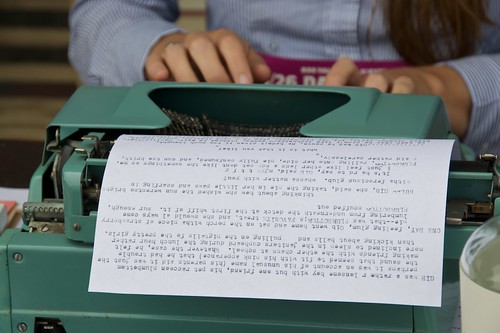 |
| Photo: “8/26 Day Write-a-thon for 826 Valencia” by Flickr user Steve Rhodes under Creative Commons 2.0 License |
Back in February
2010, the Guardian asked a number of well-established writers to offer their 10
Rules of Writing in response to Elmore Leonard’s own. Those who responded
include: Margaret Atwood, Roddy Doyle, Helen Dunmore, Richard Ford, Jonathan
Franzen, Esther Freud, PD James, Michael Moorcock, Helen Simpson, Zadie
Smith, Colm Tóibín, Sarah Waters and Elmore Leonard himself.
The results, which
can be read make interesting and entertaining reading.
Here
are some of my favourite extracts:
Elmore Leonard:
Never
open a book with weather… The reader is apt to leaf ahead looking for people.
Avoid
prologues: they can be annoying, especially a prologue following an
introduction…
Never
use a verb other than "said" to carry dialogue.
Never
use an adverb to modify the verb "said" ... he admonished gravely. To
use an adverb this way (or almost any way) is a mortal sin.
My
most important rule: if it sounds like writing, I rewrite it.
Zadie Smith:
Try
to read your own work as a stranger would read it, or even better, as an enemy
would.
There
is no "writer's lifestyle". All that matters is what you leave on the
page.
Tell
the truth through whichever veil comes to hand – but tell it.
Esther
Freud:
Trust
your reader. Not everything needs to be explained. If you really know
something, and breathe life into it, they'll know it too.
Cut
out the metaphors and similes. In my first book I promised myself I wouldn't
use any and I slipped up during a sunset in chapter 11. I still blush when I
come across it.
Hilary Mantel:
Are
you serious about this? Then get an accountant.
Michael Moorcock:
For a good melodrama study the famous "Lester Dent master
plot formula" which you can find online. It was written to show how to
write a short story for the pulps, but can be adapted successfully for most
stories of any length or genre.
(Wikipedia gives this as Michael Moorcock’s summary
of the Lester Dent master plot formula: Split your six-thousand-word story up into four fifteen hundred
word parts. Part one, hit your hero with a heap of trouble. Part two, double
it. Part three, put him in so much trouble there's no way he could ever
possibly get out of it...All your main characters have to be in the first
third. All your main themes and everything else has to be established in the
first third, developed in the second third, and resolved in the last third.)
If possible have something going on while you have your
characters delivering exposition or philosophising. This helps retain dramatic
tension.
Ignore all proferred rules and create your own, suitable for
what you want to say.
There is much more to savour in
these lists. I recommend checking out the full article. Enjoy!
Seb Kirby
 Seb Kirby is the author of the James Blake thriller series
(Take No More, Regret No More and the soon-to-be-released Forgive No More) and
the Raymond Bridges sci-fi thriller series (Double Bind).
Seb Kirby is the author of the James Blake thriller series
(Take No More, Regret No More and the soon-to-be-released Forgive No More) and
the Raymond Bridges sci-fi thriller series (Double Bind).
He says: "I was raised with books – my grandfather ran a
mobile library in Birmingham and my parents inherited a random selection of the
books. They weren't much interested in them; they were piled up in a box room,
gathering dust. I would disappear in there and resurrect much used classics –
Zane Gray's Riders of the Purple Sage, HG Wells' The Invisible Man, Charles
Dickens' A Tale of Two Cities and more obscure stuff that I don't now recall.
I was hooked. I've been an avid reader ever since."

No comments:
Post a Comment